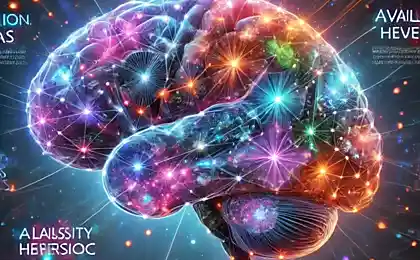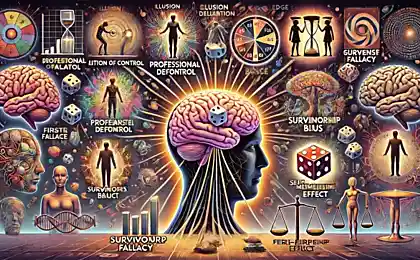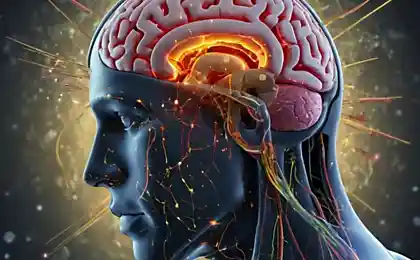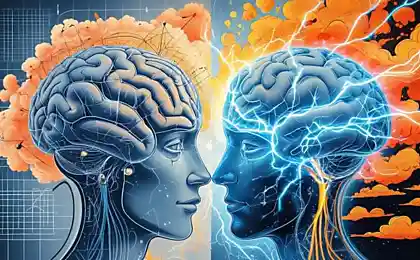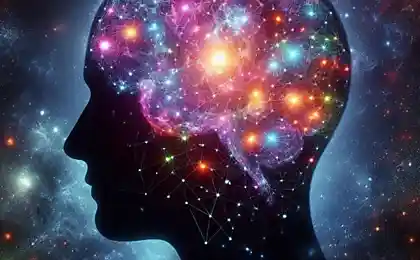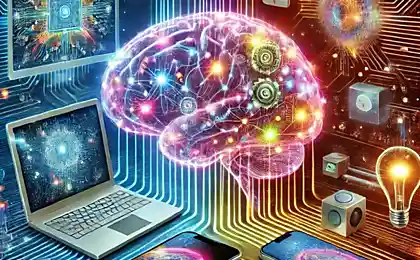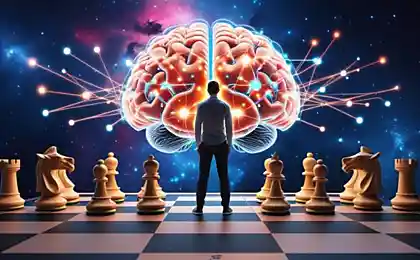594
12 cognitive biases that keep us from rational to perceive reality
The human brain is capable of performing 1016 operations per second. No computer on this volume of work is not capable. But the human brain is a very unreliable device.
The basic calculator can perform mathematical calculations a thousand times rather than people. Our memories are subjective, fragmentary and changeable. Our perception and processing of information about reality is subject to many petty interference.
The inaccuracies and errors in our perception is called cognitive distortion. They appeared out of nowhere — each caused by harsh evolutionary necessity.
To survive, our ancestors needed to think as quickly and efficiently. Our minds still retained a tendency to choose the shortest path to the evaluation of new information. These reductions of mental path called heuristics. On the one hand, heuristics help us make decisions quickly in difficult situations. On the other — each of the heuristics leads to the fact that we focus only on one aspect of complex problems and are not able clearly and adequately assess the environmental situation. Here are twelve of the most common heuristics.
Thirty nine million four hundred sixty seven thousand five hundred sixty two
1. Confirmation bias
We willingly agree with those people who are willing to agree with us. We go to sites which are close to us, political views, and our friends are likely to share our tastes and beliefs. We are trying to avoid individuals, groups, and news sites that can get you to doubt the correctness of our position in life.
American psychologist, a behaviorist Berres Frederic Skinner called this phenomenon cognitive dissonance. People don't like it when their minds face conflicting presentation: values, ideas, beliefs, emotions. To get rid of the conflict between the attitudes that we unconsciously searching for those points of view that coexist with our views.
Opinions and views that threaten our worldview are ignored or rejected. With the advent of the Internet the effect of confirmation bias only intensified to find a group of people who always and everywhere with you agree, now able to almost everyone.
2. The distortion in favor of their group
This effect is similar to confirmation bias. We tend to agree with people whom we consider members of their own group, and reject the opinions of people from other groups.
This is a manifestation of our most primitive tendencies. We strive to be at one with members of our tribe. At the level of the neurobiology of this behavior is associated with the neurotransmitter oxytocin. Is a hormone of the hypothalamus that have a powerful effect on psycho-emotional sphere of the person. Immediately after birth, oxytocin is involved in the formation of the relationship between mother and child, and more broadly, helps us to form strong ties with people from our circle.
At the same time, oxytocin causes us to suspicion, fear and even contempt for outsiders. It is a product of evolution, which survived only those groups of people who have successfully interacted with each other within the tribe and effectively repulsed the attacks of outsiders.
Nowadays cognitive bias in favor of the group makes us unreasonably high estimate of the ability and dignity of loved ones and to deny the presence of those individuals, to us personally.
3. Rationalization after the purchase
Remember when the last time you bought something unnecessary, faulty, or just too expensive? You are surely a long time to convince yourself that you did right.
This effect is also known as the Stockholm syndrome of the buyer. It's built into each of us a protective mechanism, forcing to search for arguments justifying their actions. Unconsciously we seek to prove that the money was well spent. Especially if the money was large. Social psychology explains the effect of the rationalization is simple: people willing to do anything, if only to avoid cognitive dissonance.
Buying something unnecessary, we create a conflict between actual and desired. To remove psychological discomfort, have a valid long and hard to provide for desired.
4. The effect of the player
In scientific literature is called the gamblers fallacy or a false conclusion Monte Carlo. We tend to assume that a random event dependent on random events that occurred in the past.
A classic example is the coin toss. We flipped a coin five times. If the eagle dropped more often, we will assume that the sixth time needs to fall tails. If five times fell tails, we think that the sixth time is required to drop the eagle. In fact, the probability of heads or tails on the sixth throw is the same as when the previous five-50 to 50.
Each subsequent coin toss is statistically independent from the previous one. The probability of each outcome is always 50%, but on an intuitive level people are not able to realize this.
The effect of the player superimposed underestimation of returning the value to average value. If the tails still fell six times, we begin to believe that the coin is something wrong, and that the extraordinary behaviour of the system will continue. Then begins the effect of a deviation to a positive outcome — if we were not lucky, we begin to think that sooner or later us will start to happen good things.
Similar feelings we experience, setting the stage for a new relationship. Every time we believe that this time we will be better than the previous attempt.
5. The denial of probability
Few of us are afraid to ride in the car. But the idea of flying at an altitude of 11 metres 400 Boeing causes inner trembling almost every. Flying is unnatural and somewhat dangerous. But everyone knows that the chances of dying in a car accident is much higher than the chances of dying in a plane crash.
Various sources define the chances of death in a car accident of 1 to 84, and the probability of dying in a plane crash is 1 in 5000, or even 1 to 20 000. This same phenomenon forces us to constantly worry about terrorist attacks, but actually need to be afraid of falling down the stairs or food poisoning.
American lawyer and psychologist Cass Sunstein calls this effect a denial of probability. We are not able to properly assess the risk or danger of certain classes. To simplify the probability of the risk or ignored completely, or it is attributed to critical. This leads to the fact that we consider relatively harmless activities threat, and threat is acceptable.
6. Selective perception
Suddenly we begin to pay attention to the appearance of some of the things, phenomenon or object, which is not noticed earlier. Let's say you bought a new car: everywhere on the streets you see people in the same car. We begin to think that this model car has suddenly become more popular. Although we actually just included it in the scope of his perception.
A similar effect happens to pregnant women who suddenly begin to notice how many other pregnant women. Everywhere we begin to see a significant number for us or hear our favourite song. We seem to have marked them off in his mind. Then to the selectivity of perception is added will have confirmation bias.
This effect is known in psychology as the phenomenon of Baader-Meinhof. The term was invented in 1994, the nameless visitor to the forums of the newspaper the Pioneer Press in St. Paul. Twice a day he heard the name of the German radical Faction of the red Army, founded by Andreas Baader and Ulrika Meinhof. Few people can catch themselves on the electoral perception of reality. Time we are positively bombarded with names of the German terrorists, so somewhere is brewing some kind of conspiracy!
Because of this cognitive distortion is hard to admit for some phenomenon a coincidence... although this is a coincidence.
7. The effect of the status quo
People don't like change. We tend to make decisions that will lead to the preservation of the current situation or to very minimal changes.
The effect of deviation in the direction of the status quo is easy to see in the economy and in politics. We cling to routine, bureaucracy, political parties, we are starting a chess game with the most tested moves and order a pizza with the same toppings. The danger is that the potential damage from the loss of the status quo is more important to us than the potential benefit from the new situation or alternative scenario.
This approach, which hold all conservative currents in science, religion, and politics. The most obvious example is the American health care reform and the protection of patients. Most people in the US for free (or at least cheap) medicine. But the fear of loss of status quo has led to the fact that the money for reform were not identified and from 1 to 16 October 2013 the U.S. government had to stop its work.
8. The effect of negativity
We pay more attention to bad news than good. And it's not that we're all pessimists. In the process of evolution the correct response to bad news was more important than a correct reaction to a good. The words "this berry delicious" you can skip past the ears. But the word "saber-toothed tigers eat people", a deaf ear is not recommended.
Hence the selectivity of our perception of new information. Negative news, we believe more reliable — and extremely suspicious of people who try to convince us otherwise. Nowadays the level of crime and the number of wars is lower than ever in the history of mankind. But most of us readily agrees that the situation on the Ground with each passing day it becomes worse and worse.
With the effect of negativity is linked with the concept of the fundamental error of attribution. We tend to explain the actions of others to their personal characteristics and their own behavior to external circumstances. Again, this is due to evolution and selective perception of reality. To obtain negative information about unreliable or downright dangerous members of society and quickly to react to our ancestors were much more important than adequately assess their own behavior.
9. The effect of the majority
Human beings are a collective. We like to fit in, even if we do not always realize or openly Express your nonconformity. When it comes time to bulk choose a favorite or a winner, individual thinking gives way to the group. It is called effect of joining the majority or the effect of imitation.
That's why professional scientists have a negative attitude to pre-election polls. The results of the survey might affect the results of the elections: many voters tend to change their minds in favor of the victorious in the poll side.
But it's not just about the global events like elections — effect of most can be observed in the family, and in a small office. The effect of imitation is responsible for the distribution of behaviours, social norms and ideas among groups of people regardless of what the motives or causes of these ideas, norms and forms.
The unconscious human tendency to conform and related cognitive distortions have been demonstrated in 1951 in a series of experiments, American psychologist Solomon Asch. Assembled in the auditorium, the students were shown cards with pictures and were asked questions about the length of the lines in the images. Only one student in each group was a real participant in the experiment. All the others were dummies, especially giving the wrong answer. In 75% of cases these participants agreed with the obviously wrong majority opinion.
10. Projection effect
We are very familiar with their thoughts, values, beliefs and convictions. Still, in society itself, we spend 24 hours a day!
Unconsciously we tend to assume that other people think exactly the same as we are. We believe that most others share our beliefs, even if we have no reason to. After all, to project your way of thinking on other people is very easy. But without the special psychological exercises, it is extremely difficult to learn how to project themselves into the thoughts and views of others.
This cognitive bias often leads to similar effect of false consensus. We not only believe that other people think like us, but we believe that they agree with us. We tend to exaggerate its typicality and normality, and with them, overestimating the degree of agreement with us others.
Views cults or extremist organizations share is not too a large number of people. But members of radical groups believe that the number of their supporters in the millions.
It is the effect of projection is confident that we can predict the outcome of a football match or elections.
11. The effect of the moment
Person is very difficult to imagine yourself in the future. Without special training, we are not able to predict further developments, appropriately lowering our expectations and adjust behavior. We agree on the immediate pleasure, even if in the future it heralds pain.
Hence the effect of the moment, also known as effect of revaluation of discounts. This effect seriously concerned about economists: from the tendency of people to prefer short-term benefits benefits in the distant future, follows most of the problems of the global financial system. People are willing to spend money and are extremely reluctant to set aside for a rainy day.
Also, the heuristics of the moment well-known nutritionists. In 1998, American scientists conducted a study "Predicting hunger: the effects of appetite and abstinence on food choices". Study participants were offered the choice between a healthy (fruit) and unhealthy (chocolate) food, which they will receive next week. Initially, 74% of participants chose fruit. But when the day came for the issuance of food and the experiment participants were offered the opportunity to change your selection, 70% chose chocolate.
12. The effect of binding
Getting new information, we connect it with the existing data. This is especially true of numbers.
The psychological effect in which we choose some single number as the anchor and compare it with all the new data, is called the anchoring heuristic or binding. A classic example is the cost of goods in the store. If the product is discounted, we compare the new price ($119,95) with the old amount on the price tag ($160). The cost of the actual product in this case is not taken into account. On the effect of anchor is built the whole mechanism of discounts and sales: this week only, 25% off if you buy four pairs of jeans, one pair, you will get absolutely for free!
Effect is used and about the preparation of the restaurant menus. Next to the super-expensive items out there specifically referred to a (comparatively!) cheap. We react not on the price of the cheapest items, and the difference in price between a salmon steak on the podium of asparagus and chicken cutlet. On the background of steak for 650 rubles cutlet 190 seems completely normal.
The effect of the armature occurs when give a choice of three options: very high, medium and very cheap. We choose the middle option, which is the background of the other two options seems the least suspicious.
source
Source: /users/1077
The basic calculator can perform mathematical calculations a thousand times rather than people. Our memories are subjective, fragmentary and changeable. Our perception and processing of information about reality is subject to many petty interference.
The inaccuracies and errors in our perception is called cognitive distortion. They appeared out of nowhere — each caused by harsh evolutionary necessity.
To survive, our ancestors needed to think as quickly and efficiently. Our minds still retained a tendency to choose the shortest path to the evaluation of new information. These reductions of mental path called heuristics. On the one hand, heuristics help us make decisions quickly in difficult situations. On the other — each of the heuristics leads to the fact that we focus only on one aspect of complex problems and are not able clearly and adequately assess the environmental situation. Here are twelve of the most common heuristics.
Thirty nine million four hundred sixty seven thousand five hundred sixty two
1. Confirmation bias
We willingly agree with those people who are willing to agree with us. We go to sites which are close to us, political views, and our friends are likely to share our tastes and beliefs. We are trying to avoid individuals, groups, and news sites that can get you to doubt the correctness of our position in life.
American psychologist, a behaviorist Berres Frederic Skinner called this phenomenon cognitive dissonance. People don't like it when their minds face conflicting presentation: values, ideas, beliefs, emotions. To get rid of the conflict between the attitudes that we unconsciously searching for those points of view that coexist with our views.
Opinions and views that threaten our worldview are ignored or rejected. With the advent of the Internet the effect of confirmation bias only intensified to find a group of people who always and everywhere with you agree, now able to almost everyone.
2. The distortion in favor of their group
This effect is similar to confirmation bias. We tend to agree with people whom we consider members of their own group, and reject the opinions of people from other groups.
This is a manifestation of our most primitive tendencies. We strive to be at one with members of our tribe. At the level of the neurobiology of this behavior is associated with the neurotransmitter oxytocin. Is a hormone of the hypothalamus that have a powerful effect on psycho-emotional sphere of the person. Immediately after birth, oxytocin is involved in the formation of the relationship between mother and child, and more broadly, helps us to form strong ties with people from our circle.
At the same time, oxytocin causes us to suspicion, fear and even contempt for outsiders. It is a product of evolution, which survived only those groups of people who have successfully interacted with each other within the tribe and effectively repulsed the attacks of outsiders.
Nowadays cognitive bias in favor of the group makes us unreasonably high estimate of the ability and dignity of loved ones and to deny the presence of those individuals, to us personally.
3. Rationalization after the purchase
Remember when the last time you bought something unnecessary, faulty, or just too expensive? You are surely a long time to convince yourself that you did right.
This effect is also known as the Stockholm syndrome of the buyer. It's built into each of us a protective mechanism, forcing to search for arguments justifying their actions. Unconsciously we seek to prove that the money was well spent. Especially if the money was large. Social psychology explains the effect of the rationalization is simple: people willing to do anything, if only to avoid cognitive dissonance.
Buying something unnecessary, we create a conflict between actual and desired. To remove psychological discomfort, have a valid long and hard to provide for desired.
4. The effect of the player
In scientific literature is called the gamblers fallacy or a false conclusion Monte Carlo. We tend to assume that a random event dependent on random events that occurred in the past.
A classic example is the coin toss. We flipped a coin five times. If the eagle dropped more often, we will assume that the sixth time needs to fall tails. If five times fell tails, we think that the sixth time is required to drop the eagle. In fact, the probability of heads or tails on the sixth throw is the same as when the previous five-50 to 50.
Each subsequent coin toss is statistically independent from the previous one. The probability of each outcome is always 50%, but on an intuitive level people are not able to realize this.
The effect of the player superimposed underestimation of returning the value to average value. If the tails still fell six times, we begin to believe that the coin is something wrong, and that the extraordinary behaviour of the system will continue. Then begins the effect of a deviation to a positive outcome — if we were not lucky, we begin to think that sooner or later us will start to happen good things.
Similar feelings we experience, setting the stage for a new relationship. Every time we believe that this time we will be better than the previous attempt.
5. The denial of probability
Few of us are afraid to ride in the car. But the idea of flying at an altitude of 11 metres 400 Boeing causes inner trembling almost every. Flying is unnatural and somewhat dangerous. But everyone knows that the chances of dying in a car accident is much higher than the chances of dying in a plane crash.
Various sources define the chances of death in a car accident of 1 to 84, and the probability of dying in a plane crash is 1 in 5000, or even 1 to 20 000. This same phenomenon forces us to constantly worry about terrorist attacks, but actually need to be afraid of falling down the stairs or food poisoning.
American lawyer and psychologist Cass Sunstein calls this effect a denial of probability. We are not able to properly assess the risk or danger of certain classes. To simplify the probability of the risk or ignored completely, or it is attributed to critical. This leads to the fact that we consider relatively harmless activities threat, and threat is acceptable.
6. Selective perception
Suddenly we begin to pay attention to the appearance of some of the things, phenomenon or object, which is not noticed earlier. Let's say you bought a new car: everywhere on the streets you see people in the same car. We begin to think that this model car has suddenly become more popular. Although we actually just included it in the scope of his perception.
A similar effect happens to pregnant women who suddenly begin to notice how many other pregnant women. Everywhere we begin to see a significant number for us or hear our favourite song. We seem to have marked them off in his mind. Then to the selectivity of perception is added will have confirmation bias.
This effect is known in psychology as the phenomenon of Baader-Meinhof. The term was invented in 1994, the nameless visitor to the forums of the newspaper the Pioneer Press in St. Paul. Twice a day he heard the name of the German radical Faction of the red Army, founded by Andreas Baader and Ulrika Meinhof. Few people can catch themselves on the electoral perception of reality. Time we are positively bombarded with names of the German terrorists, so somewhere is brewing some kind of conspiracy!
Because of this cognitive distortion is hard to admit for some phenomenon a coincidence... although this is a coincidence.
7. The effect of the status quo
People don't like change. We tend to make decisions that will lead to the preservation of the current situation or to very minimal changes.
The effect of deviation in the direction of the status quo is easy to see in the economy and in politics. We cling to routine, bureaucracy, political parties, we are starting a chess game with the most tested moves and order a pizza with the same toppings. The danger is that the potential damage from the loss of the status quo is more important to us than the potential benefit from the new situation or alternative scenario.
This approach, which hold all conservative currents in science, religion, and politics. The most obvious example is the American health care reform and the protection of patients. Most people in the US for free (or at least cheap) medicine. But the fear of loss of status quo has led to the fact that the money for reform were not identified and from 1 to 16 October 2013 the U.S. government had to stop its work.
8. The effect of negativity
We pay more attention to bad news than good. And it's not that we're all pessimists. In the process of evolution the correct response to bad news was more important than a correct reaction to a good. The words "this berry delicious" you can skip past the ears. But the word "saber-toothed tigers eat people", a deaf ear is not recommended.
Hence the selectivity of our perception of new information. Negative news, we believe more reliable — and extremely suspicious of people who try to convince us otherwise. Nowadays the level of crime and the number of wars is lower than ever in the history of mankind. But most of us readily agrees that the situation on the Ground with each passing day it becomes worse and worse.
With the effect of negativity is linked with the concept of the fundamental error of attribution. We tend to explain the actions of others to their personal characteristics and their own behavior to external circumstances. Again, this is due to evolution and selective perception of reality. To obtain negative information about unreliable or downright dangerous members of society and quickly to react to our ancestors were much more important than adequately assess their own behavior.
9. The effect of the majority
Human beings are a collective. We like to fit in, even if we do not always realize or openly Express your nonconformity. When it comes time to bulk choose a favorite or a winner, individual thinking gives way to the group. It is called effect of joining the majority or the effect of imitation.
That's why professional scientists have a negative attitude to pre-election polls. The results of the survey might affect the results of the elections: many voters tend to change their minds in favor of the victorious in the poll side.
But it's not just about the global events like elections — effect of most can be observed in the family, and in a small office. The effect of imitation is responsible for the distribution of behaviours, social norms and ideas among groups of people regardless of what the motives or causes of these ideas, norms and forms.
The unconscious human tendency to conform and related cognitive distortions have been demonstrated in 1951 in a series of experiments, American psychologist Solomon Asch. Assembled in the auditorium, the students were shown cards with pictures and were asked questions about the length of the lines in the images. Only one student in each group was a real participant in the experiment. All the others were dummies, especially giving the wrong answer. In 75% of cases these participants agreed with the obviously wrong majority opinion.
10. Projection effect
We are very familiar with their thoughts, values, beliefs and convictions. Still, in society itself, we spend 24 hours a day!
Unconsciously we tend to assume that other people think exactly the same as we are. We believe that most others share our beliefs, even if we have no reason to. After all, to project your way of thinking on other people is very easy. But without the special psychological exercises, it is extremely difficult to learn how to project themselves into the thoughts and views of others.
This cognitive bias often leads to similar effect of false consensus. We not only believe that other people think like us, but we believe that they agree with us. We tend to exaggerate its typicality and normality, and with them, overestimating the degree of agreement with us others.
Views cults or extremist organizations share is not too a large number of people. But members of radical groups believe that the number of their supporters in the millions.
It is the effect of projection is confident that we can predict the outcome of a football match or elections.
11. The effect of the moment
Person is very difficult to imagine yourself in the future. Without special training, we are not able to predict further developments, appropriately lowering our expectations and adjust behavior. We agree on the immediate pleasure, even if in the future it heralds pain.
Hence the effect of the moment, also known as effect of revaluation of discounts. This effect seriously concerned about economists: from the tendency of people to prefer short-term benefits benefits in the distant future, follows most of the problems of the global financial system. People are willing to spend money and are extremely reluctant to set aside for a rainy day.
Also, the heuristics of the moment well-known nutritionists. In 1998, American scientists conducted a study "Predicting hunger: the effects of appetite and abstinence on food choices". Study participants were offered the choice between a healthy (fruit) and unhealthy (chocolate) food, which they will receive next week. Initially, 74% of participants chose fruit. But when the day came for the issuance of food and the experiment participants were offered the opportunity to change your selection, 70% chose chocolate.
12. The effect of binding
Getting new information, we connect it with the existing data. This is especially true of numbers.
The psychological effect in which we choose some single number as the anchor and compare it with all the new data, is called the anchoring heuristic or binding. A classic example is the cost of goods in the store. If the product is discounted, we compare the new price ($119,95) with the old amount on the price tag ($160). The cost of the actual product in this case is not taken into account. On the effect of anchor is built the whole mechanism of discounts and sales: this week only, 25% off if you buy four pairs of jeans, one pair, you will get absolutely for free!
Effect is used and about the preparation of the restaurant menus. Next to the super-expensive items out there specifically referred to a (comparatively!) cheap. We react not on the price of the cheapest items, and the difference in price between a salmon steak on the podium of asparagus and chicken cutlet. On the background of steak for 650 rubles cutlet 190 seems completely normal.
The effect of the armature occurs when give a choice of three options: very high, medium and very cheap. We choose the middle option, which is the background of the other two options seems the least suspicious.
source
Source: /users/1077
